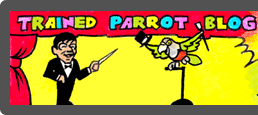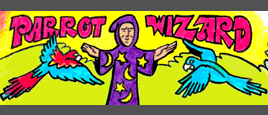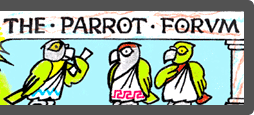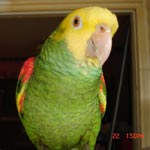Hi guys! So i'm a college student and I realized that I work my best from home, so I do 2/3 classes online and get to stay home the majority of the week unless its for a couple of hours or work on the weekends. I recently bought a 12 year old Blue Crowned Conure and he's gorgeous, super vocal (I like it, but I can see why some people don't!), and likes to look at me any time i'm around. It's about 4 weeks in to me getting him and the first week was such a set back, any time i'd put my hand in the cage, he'd run or nip, or screech. The second week rolled around and he started taking food from my hand, third week came and I decided I would leave the cage door open for him, he was hesistant at first but with some coaxing and sweet talk he was out and climbing the outside of his cage. Now that the fourth week has come around he's comfortable stepping down from his cage onto the table his cage is on.
The only problem I have is getting him to 1, not bite and 2, step up. Virtually anytime my hand is resting on his cage or on the table (if his hand is on the table) he'll run over to nip it away, I say nip because he doesnt seem to get all too aggressive about it (no fluffed up feathers or screeching). He's kind of big, well at least bigger than I expected so i'll put my arm up to him feet and he'll either back up or nip at it. Any tips? I asked the people I bought him from how they managed to get him onto them and they simply replied that they would put their finger or arm up and he'd step up. They also let me know that Polly was bought for their children, which are now in their late 20's or early 30's, and he gradually lost the amount of handling he once had. I completely understand that this is gonna take a while and a lot of trust, but I just want to make sure i'm doing it right. Please respond with any tips or if you've had any experience re-training parrots.
Thank you!



12 Year Old Blue Crowned Conure Hates my Hands
4 posts • Page 1 of 1
- jtalavera97
- Parakeet
- Gender:

- Posts: 1
- Number of Birds Owned: 3
- Types of Birds Owned: Parakeet, canary and blue crowned conure
- Flight: No
Re: 12 Year Old Blue Crowned Conure Hates my Hands
Nope you are not doing this right. First thing that you need to be aware of is that if the cage fits on a table then it is very likely to be too small for this bird. This species of conure is between 14 and 15 inches long, this means that his/ her wingspan is 28 to 30 inches which means that the minimum width that the cage needs to be is 60 inches and about the same height and at least 24 inches deep.
The first month or so after you bring a new parrot home is often referred to as the honeymoon phase as at this time the bird is usually on its very best behavior due to fear of its new human and environment. To gain the birds trust you need to keep your hands away and just talk and sing to your new bird. let it get accustomed to the sound of your voice as well as your presence. You watch what foods( we'll get to that shortly) your bird chooses to eat first and reserve it for treats that you can begin to offer to the bird through the cage bars. when it starts taking the treats from you in this manner then and only then do you open the cage door while you talk, read and sing to him/ her to offer the treat directly from your fingers. Now since the bird already knew the step up request and if you have been patient with the bird and let it set the pace it will probably step up for you when you ask it to and give it a treat. Now that is what you should have done,
What you did was a mistake and as a result the bird does not trust you which is why it nips you in the manner that you have described as well as why it will not step up for you. So what you need to do is begin all over using the procedure that I have outlined for you.
With a bird it is all about trust and you can't force or rush it and parrots do not just blindly give their trust you need to show it that you can be trusted and that you are the bringer of good things and that you will not hurt it.
Now I would still continue to give your bird as much out of cage time as it is possible to give it. This is especially important for your bird as the cage you currently have is too small ( I think). Normally I would just recommend a minimum of four hours out of cage time and an additional hour of one on one time. And to be certain, one on one means that the birds is in physical contact with you for a substantial portion of the time.
Now then I do not presently know what you are feeding your new bird, but parrots, regardless of the species does not eat just seeds or pellets as feeding them only these or too much of them will lead to several problems among which is fatty liver disease which can be fatal if not caught soon enough and treated, probably for the remainder of its life. It needs to eat a large variety of fresh vegetables and fruits as well as whole grains and pulses, with just a limited amount of a high quality seed mix or if you must pellets again of a high quality and devoid of sugars and colorings and soy products.
Your new bird friend will need to have its cage placed with one side near to a solid wall and preferably be close to a window. It needs to be kept on a solar light schedule, which is one wherein the bird is exposed to the twilight period of dawn, gets up with the sunrise and is again exposed to the twilight period of dusk and then goes to sleep by full dark. This is to keep it's biological clock and endocrine system in tune with the proper season, otherwise it will go into breeding condition and not go out of it which will lead to intense chronic pain and an excruciatingly painful demise as its gonads swell and put pressure on all of its internal organs until something finally ruptures or the pressure just stops the heart.
Now we all love our birds and in fact, while you may find it hard to believe ,we care as much about the welfare of your bird as we do about our own birds. We also like to play with them and pet them ,but we have learned, many of us the hard way to only pet out birds on their head, their beaks and their necks as the rest of the bird is one big erogenous zone, and since this gets them sexually excited and offers them no release from sexual frustration it is much better to refrain from such inappropriate touching.
One more thing, you need to take your bird to see an avian vet for a general wellness exam.
This just about covers the very basics of parrot keeping as well as answering your original question. We can help you to set up a good healthy diet for your bird as well as help you to get them to eat it, if you will tell us what you currently feed the bird and when you feed it. We love picture. Pictures of your cage and of your bird , So when you have the chance and the time please show us your new friend and its living space.
Oh, don't use any non stick pots and pans or any appliances with a nonstick coating as it will kill your bird very quickly, in a matter of seconds. And that goes for self cleaning ovens as well.
The first month or so after you bring a new parrot home is often referred to as the honeymoon phase as at this time the bird is usually on its very best behavior due to fear of its new human and environment. To gain the birds trust you need to keep your hands away and just talk and sing to your new bird. let it get accustomed to the sound of your voice as well as your presence. You watch what foods( we'll get to that shortly) your bird chooses to eat first and reserve it for treats that you can begin to offer to the bird through the cage bars. when it starts taking the treats from you in this manner then and only then do you open the cage door while you talk, read and sing to him/ her to offer the treat directly from your fingers. Now since the bird already knew the step up request and if you have been patient with the bird and let it set the pace it will probably step up for you when you ask it to and give it a treat. Now that is what you should have done,
What you did was a mistake and as a result the bird does not trust you which is why it nips you in the manner that you have described as well as why it will not step up for you. So what you need to do is begin all over using the procedure that I have outlined for you.
With a bird it is all about trust and you can't force or rush it and parrots do not just blindly give their trust you need to show it that you can be trusted and that you are the bringer of good things and that you will not hurt it.
Now I would still continue to give your bird as much out of cage time as it is possible to give it. This is especially important for your bird as the cage you currently have is too small ( I think). Normally I would just recommend a minimum of four hours out of cage time and an additional hour of one on one time. And to be certain, one on one means that the birds is in physical contact with you for a substantial portion of the time.
Now then I do not presently know what you are feeding your new bird, but parrots, regardless of the species does not eat just seeds or pellets as feeding them only these or too much of them will lead to several problems among which is fatty liver disease which can be fatal if not caught soon enough and treated, probably for the remainder of its life. It needs to eat a large variety of fresh vegetables and fruits as well as whole grains and pulses, with just a limited amount of a high quality seed mix or if you must pellets again of a high quality and devoid of sugars and colorings and soy products.
Your new bird friend will need to have its cage placed with one side near to a solid wall and preferably be close to a window. It needs to be kept on a solar light schedule, which is one wherein the bird is exposed to the twilight period of dawn, gets up with the sunrise and is again exposed to the twilight period of dusk and then goes to sleep by full dark. This is to keep it's biological clock and endocrine system in tune with the proper season, otherwise it will go into breeding condition and not go out of it which will lead to intense chronic pain and an excruciatingly painful demise as its gonads swell and put pressure on all of its internal organs until something finally ruptures or the pressure just stops the heart.
Now we all love our birds and in fact, while you may find it hard to believe ,we care as much about the welfare of your bird as we do about our own birds. We also like to play with them and pet them ,but we have learned, many of us the hard way to only pet out birds on their head, their beaks and their necks as the rest of the bird is one big erogenous zone, and since this gets them sexually excited and offers them no release from sexual frustration it is much better to refrain from such inappropriate touching.
One more thing, you need to take your bird to see an avian vet for a general wellness exam.
This just about covers the very basics of parrot keeping as well as answering your original question. We can help you to set up a good healthy diet for your bird as well as help you to get them to eat it, if you will tell us what you currently feed the bird and when you feed it. We love picture. Pictures of your cage and of your bird , So when you have the chance and the time please show us your new friend and its living space.
Oh, don't use any non stick pots and pans or any appliances with a nonstick coating as it will kill your bird very quickly, in a matter of seconds. And that goes for self cleaning ovens as well.
- Wolf
- Macaw
- Gender:

- Posts: 8679
- Location: Lansing, NC
- Number of Birds Owned: 6
- Types of Birds Owned: Senegal
African Grey (CAG)
Yellow Naped Amazon
2Celestial Parrotlet
Budgie - Flight: Yes
Re: 12 Year Old Blue Crowned Conure Hates my Hands
1 Avian Vet your cage is probably small enough to just take him in that but cover top and three sides with a towel to keep the wind off him.
2 As big a cage as you can afford they do cost but it is an investment in your birds happiness.
It doesn't have to be heavy made just big. If you don't have enough room get rid of a piece of furniture.
3 Get a bird light I thought my kids were happy before but they told me they really like that light.
4 Follow the light and diet rules.
5 The birds cage is his home. Do not go in after him. Never grab. Keep your hands palm down when in his cage.
6 When he bites you and it will happen, do not react. If you do he will learn that it is a way to control you. Don't push him away. If he bites and does not let go, grin and bare it.
7 You only know what you have been told about his back round, personality and number of rehomes. This info is hear say. Go by what you see.
2 As big a cage as you can afford they do cost but it is an investment in your birds happiness.
It doesn't have to be heavy made just big. If you don't have enough room get rid of a piece of furniture.
3 Get a bird light I thought my kids were happy before but they told me they really like that light.
4 Follow the light and diet rules.
5 The birds cage is his home. Do not go in after him. Never grab. Keep your hands palm down when in his cage.
6 When he bites you and it will happen, do not react. If you do he will learn that it is a way to control you. Don't push him away. If he bites and does not let go, grin and bare it.
7 You only know what you have been told about his back round, personality and number of rehomes. This info is hear say. Go by what you see.
-

liz - Macaw
- Gender:

- Posts: 7234
- Location: Hernando FL
- Number of Birds Owned: 12
- Types of Birds Owned: DYH Amazon Rambo
BF Amazon Myrtle
Cockatiels: Shadow Tammy Flutter Phoenix Jackie
Andy Impy Louise Twila Leroy - Flight: Yes
4 posts • Page 1 of 1
Return to Taming & Basic Training
Who is online
Users browsing this forum: No registered users and 18 guests
